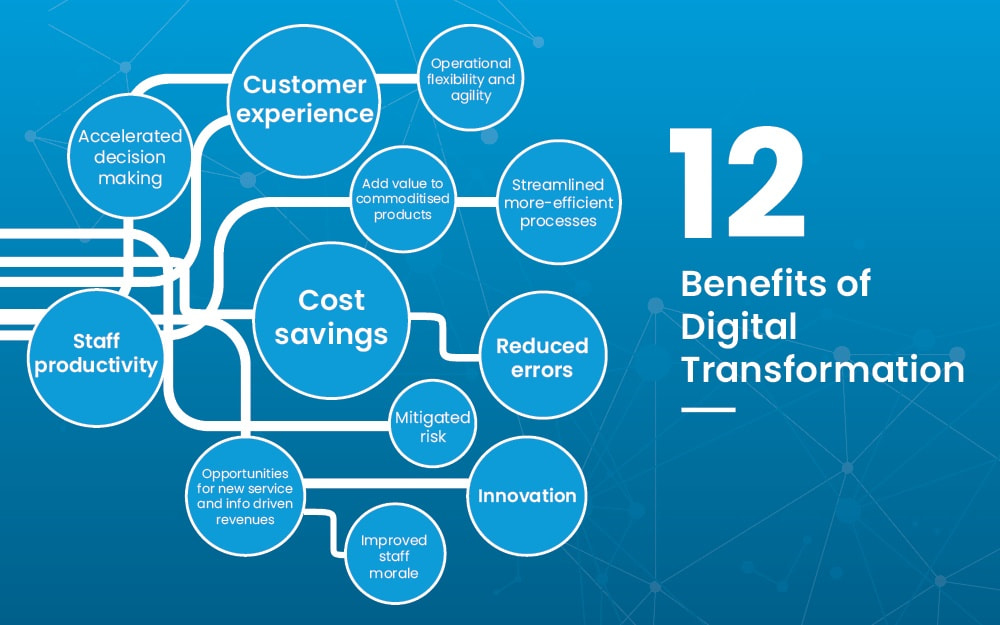To become as efficient as possible within this new digital landscape, organisations should frequently be reviewing the new technologies available to them. The implementation of Digital Transformation not only encourages digital culture and leadership both in the office and when working remotely, yet it also enhances workforce enablement, improves productivity and greater resource management whilst ensuring flexibility is maximised.
What is Digital Transformation?
The term ‘Digital Transformation’ can be defined as ‘The integration of digital technology into all aspects of a business, transforming its processes, operations and client experience and how they deliver value to stakeholders’.
As the definition of digital transformation varies from sector to sector, so will the rate of adoption. Organisations, depending on the size of their operations, may view the implementation of Digital Transformation as a mountain, while others, a molehill. Irrespective of the challenge, organisations shouldn’t be discouraged from embracing what digital transformation can deliver in the way of improving business processes and client satisfaction in the 21st century.
It isn’t just about speeding up traditional processes, it is about improving client and employee experiences. Digital transformation is about changing the mind-set of the organisation and about addressing any wants or needs in order for it to operate competitively within the digital world. This is only achievable if within the organisation everyone is on the same page.
What are the key drivers of digital transformation?
-
Rise in customer expectations
-
Competitive pressure
-
The need to improve productivity
-
Increase speed to market
-
Leveraging consumer insight
-
Reducing risk and improving security
Why adopt Digital Transformation?
Digital transformation is an important component for many organisations to consider with regards to technology and processes. Keeping employees connected and having regular process refreshes is imperative for organisations to operate effectively within this new remote working environment. Some organisations have completed process after process, following the same business model endlessly without thinking outside of the box and building a Digital Transformation strategy with the potential to significantly differentiate between their existing operations.
Not only does Digital Transformation enable users to connect all touchpoints of operations both for employees and customers, implementing Digital Transformation permits organisations to access key information, act on and leverage it to drive accelerated decision making, for a greater and enhanced experience for all stakeholders. Digital Transformation is about driving change, agility, speed and connectivity in real-time, meeting client expectations whilst driving your organisations into the future digital landscape which is key for operating successfully whilst away from the traditional office space.
What are the goals in achieving digital transformation?
-
Improve operational efficiency
-
Improve internal or external customer experience
-
Improve level of agility
-
Better management of business risk
The competitive advantage of digital transformation
Digitally transforming business methods and processes with the latest technology brings with it improvements in employee productivity, client retention and cost savings. This is all whilst creating transparency among consumers, B2B or B2C, who are demanding it now more than ever.
Part of this adoption is the utilisation of Cloud-based solutions and leveraging its flexibility to provide an enhanced 360-degree experience. With the right tools, an organisation can gain a competitive advantage by increasingly removing manual processes, adding automation and improving workflows. This is advantageous as it leads to:
-
Increased sales performance
-
Increased employee productivity
-
Reduced costs and improved operational efficiency
-
Enhanced client experience
-
Market differentiation
Digital transformation is reshaping the aspect of the traditional organisation, giving it a level of transparency that was unfamiliar five years ago – enhancing the control in which it operates remotely. From improving the speed of decision making with real-time data available, to improvements in client experience by giving them exactly what they need, whenever and wherever they need it, which has become an increasing requirement with ever growing client demands.

Moving towards a client-centric approach
The rapid development to remote working and the ever-changing digital landscape leaves no time for organisations to be complacent when it comes to meeting client demands.
One of the biggest winners for organisations is the real-time feedback and ability to adapt to market changes, enabling them to identify needs and wants almost immediately. This gives them the capability to adapt products and services to a dynamic changing consumer driven market.
By using technology to understand customer insights organisations can make informed choices based on accurate real-time feedback. Social collaboration tools help businesses make faster decisions concerning product and service innovations, making it even easier to achieve the co-creation of new products.
Employee adoption
By adopting a digital-first business strategy and using technology as an enabler, it can help employees reach their full potential whilst working remotely. To embrace this change and ensure business continuity, today’s leadership teams are now progressively motivated by adopting the tools that can enable their workforce to work flexibly and effectively.
Collaboration is essential to aligning the new culture that is digital transformation. To unlock the true value of employees, organisations must take the steps to access the tools that keep staff productive from any given location, whilst minimising any added risks.
The risk of digital transformation
Although digital transformation comes with greater risk of exposure, especially when working remotely, if you want to transform the way you do business and serve clients better or optimise the experience then you must mitigate the risk to your organisation by transforming business operations, just without the risk to client and employee data.
With the increasing use of digital solutions such as the cloud, mobile working and the IoT in more areas of businesses, this connectivity brings its own inherent risks that organisations cannot ignore and must prepare before it is too late.
Cybersecurity is critical from the outset of the digital transformation, the need to understand how you will use data, how it will be stored and now organisations can turn to artificial intelligence (AI) and machine learning (ML) techniques to automate threat detection and eradicate to protect client data.
As technology and our new remote working environment evolves, so will the way in which we interact and use the available data to our advantage. For organisations to stay competitive in this new remote and flexible environment, they must evolve the way in which they manage and use this data. To truly take advantage of these opportunities, organisations must become digitally centric in their operations embracing change internally to allow the experience to flow through to the clients.
By utilising this inter-connectivity, it helps push the boundaries so that organisations can revolutionise legacy systems and introduce this new digital landscape. In turn, the implementation of Digital Transformation into an organisation will make significant improvements to both the client and employee experience. So, to learn how your organisation can enhance collaboration and accelerate yourselves into the 21st Century digital landscape, get in touch using the form below.















































